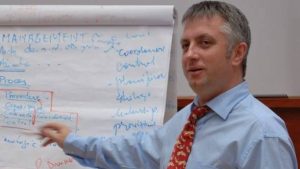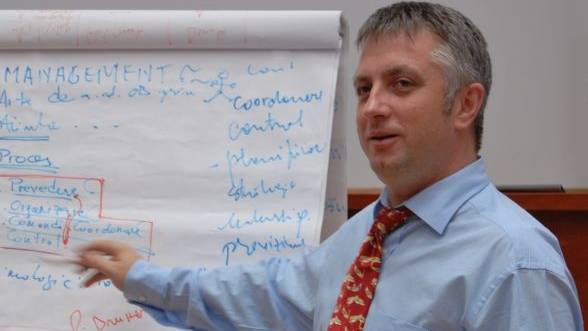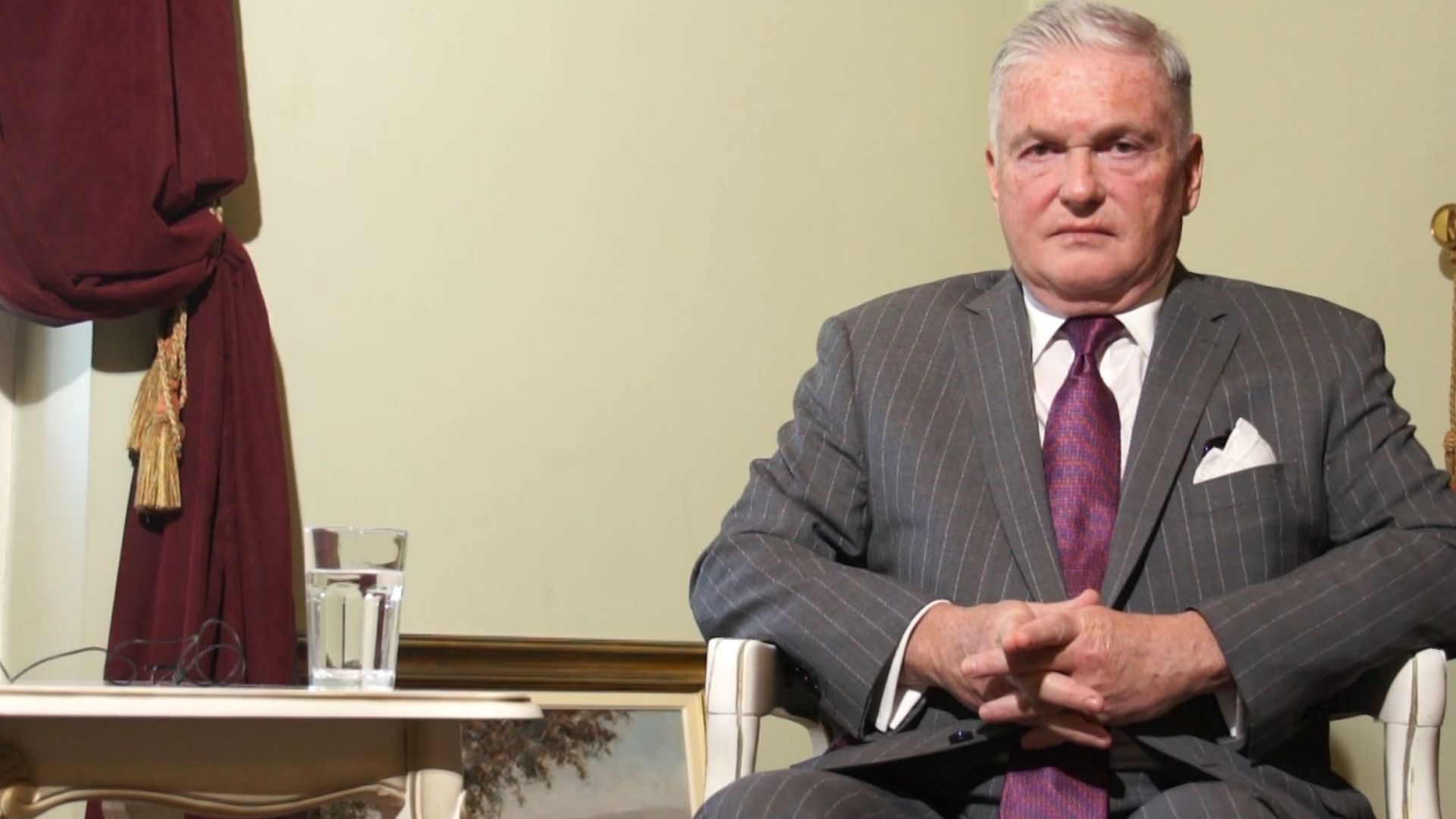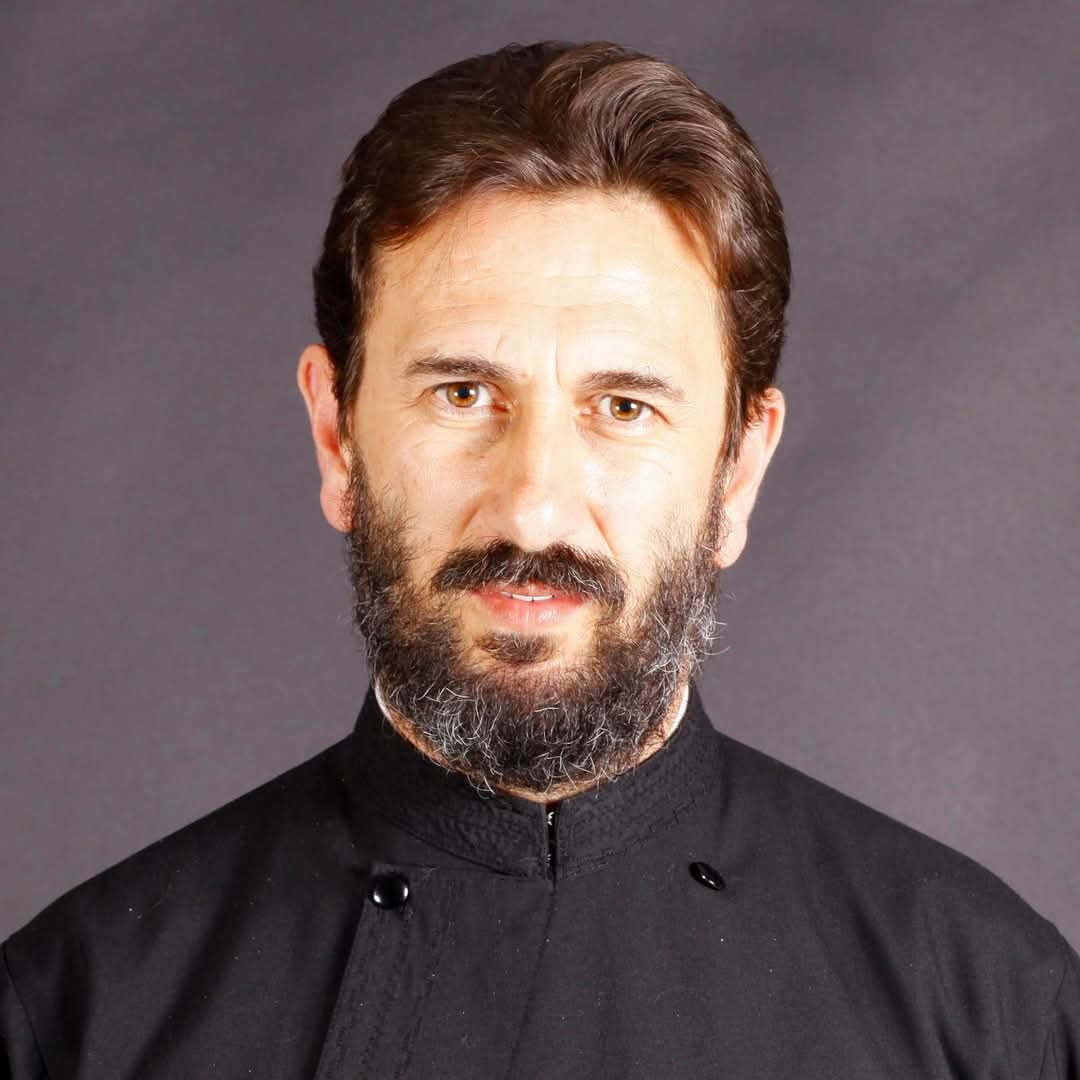Cartea lui Adrian Cioroianu Focul ascuns în piatră. Despre istorie, memorie şi alte vanităţi contemporane (Ed. Polirom, Iaşi, 2002) reprezintă o surpriză plăcută pentru cititorul plictisit cu prezentările searbede, ca nişte litanii ale paginilor unora dintre cărţile de istorie. Poţi să fi sau nu de acord cu activitatea sa politică, dar pe istoricul, pe jurnalistul şi eseistul Cioroianu ţi-l doreşti ca partener de discuţii. Are un stil interesant şi observă lucruri care scăpa ochiului obişnuit, de aceea lectura acestei cărţi este o treaptă în cunoaştere şi o plăcere estetică.
Ajuns cu o bursă în Canada, la Universitatea Laval din ville de Quebec, Canada, în splendida lună septembrie a anului 1995, Adrian Cioroianu a fost invitat de profesorul Bogumil Jewsievicki Koss – coordonatorul tezei sale de doctorat – să susţină o conferinţă cu subiectul Mitul şi reprezentările Conducătorului: cazul Ceauşescu. În timpul expunerii, Cioroianu a observat în sală o doamnă care nu l-a slăbit o clipă din priviri şi care a ţinut morţiş sa pună prima întrebare. Aşteptându-se să fie vorba de ceva legat de conţinut, Adrian Cioroianu a fost în parte deziluzionat, în parte uluit când a auzit următoarele: – “Spuneti-mi, astăzi în România femeile au drept de vot?”
Pentru un intelectual venit dintr-o ţara care ieşise cu câţiva ani în urmă din marasmul comunist, întrebarea doamnei introducea o frântură dintr-o realitate la care nu se aşteptase pe continental nord-american: corectitudinea politică. În continuare vă prezentăm care au fost comentariile viitorului ministru de externe al României în legătură cu acest subiect.
Focul ascuns în piatră. Despre istorie, memorie şi alte vanităţi contemporane
Adrian Cioroianu
În acest fel am pătruns eu în mecanismele uneia din ultimele mode de peste ocean – political correctness, problemă (imaginată, după părerea mea) în legătură cu care păstrez încă o mare doză de scepticism, unicul aspect pe care-l cred plecat din normalitate, dar puţin dincolo de ea. Regulile sale nescrise, privite din afara acelei societăţi care au creat-o, par de domeniul ridicolului; cu sinceritate o spun, mi s-au părut a fi deseori la fel chiar şi private din interior. Mi-aduc aminte de sfaturile colegilor mei québécois, care mai de care mai stranii pentru mine. În avanpremiera lui 8 martie 1996, am aflat astfel că în spaţiul universitar nu trebuie să dai flori unei profesoare – pentru că ea este, în raport cu tine şi în acest spaţiu, professor, şi nu femeie, iar o floare dăruită ar face trimitere la calitatea ei de femeie, şi nu de dascăl. Pe de altă parte, mi s-a spus tainic – şi din acest motiv la correction politique mi s-a părut a fi un ambalaj inteligent pentru un respect cam ipocrit uneori – că nici secretarele nu pot să primească flori, dar nu le deranjează în realitate. (Evident, mai depinde şi de oameni: în ianuarie 2002, aveam să aflu păţania unui student român care, relativ dezinteresat, dorise să dea un buchet de flori unei secretare şi aceasta îl refuzase puţin speriată). La fel cu sărutatul mâinii, o practică incorectă în teorie pentru canadiancă din spaţiul universitar; în schimb, am văzut profesoare, supuse acestui tratament, înroşindu-se de surpriză şi de plăcere (nu este cazul, cred, să dau amănunte care oricum ar fi ele însele incorecte politic).
Sau: zi de zi, mergând spre biroul meu de la etajul cinci din Pavilionul Charles De Koninck, vedeam birourile profesorilor care aveau ore de consultaţii. În interior, profesorul şi câte o studentă/un student şi, enigmă pentru mine, uşa spre culoar deschisă. Eu însumi, de câte ori intram în biroul vreunui professor, închideam uşa dintr-un gest reflex. Mai ales în prima fază a colaborării noastre, ei se ridicau discret şi o deschideau. Am înţeles, ajutat de cineva: pentru a preîntâmpina ipotetice acuze de hârţuire (probabil în urmă semnalului dat de un caz celebru dintr-o universitate din Statele Unite, de la mijlocul anilor ’90), profesorii lasă uşa biroului deschisă cât timp durează consultaţia. În fine, culmea uimirii am trăit-o într-o librărie, în preajma Crăciunului: în rafturi, cărticele cu povestiri biblice pentru copii, pe cât de bogat ilustrate, pe atât de corecte: în unele, sfinţii şi Dumnezeii erau femei, în altele, persoane de culoare, în altele, chiar purtau ochelari sau apăreau, pur şi simplu, în cărucioare de invalizi. Sigur că idea în sine este nobilă. Dar nu ştiu dacă nu cumva prea multă corectitudine politică nu ne transformă în ipocrite fiinţe de azbest ideologizat.
Textul citat se află la paginile 343-344.




















5 Comments
Dinny
26 November 2008„sfinţii şi Dumnezeii erau femei, în altele, persoane de culoare, în altele, chiar purtau ochelari sau apăreau, pur şi simplu, în cărucioare de invalizi.”
Asta e prea de tot! Nu e suficient ca, neavand acces la adevarata fata a lui Dumnezeu, il reprezentam ca pe un batran cu barba alba [reprezentarea asta e macar validata de practica traditiei], dar sa-l faci femeie! Mi se pare bataie de joc.
Cat despre sarutatul mainii, din proprie experienta spun ca majoritatea barbatilor habar n-au cum se procedeaza; putinii care mai practica acest gen de curtoazie iti apuca mana si o ridica pana la nivelul gurii, in loc sa se aplece ei pana la nivelul mainii tale, cum cere eticheta.
Dinny
26 November 2008Mda…revin. E penibil de-a dreptul ca sa nu zic blasfemie. Existau carucioare de invalizi si ochelari pe vremea Sf. Pavel? O targa era mai nimerita. Cat despre „persoane de culoare” iconografia crestina prezinta in general sfintii care sunt persoanele de culoare exact asa cum sunt. Atatia au fost, asta e. Whatever…
Imperialistu'
26 November 2008German Bible Goes Politically Correct
A new German translation of the Bible is aimed at ridding the Holy Scriptures of their misogynist and anti-Semitic traits as well as flashing out the relationship between the poor and the privileged.
A new German translation of the Holy Scriptures, entitled „The Bible in Fair Language,” will be published this fall, in time for the international book fair in Frankfurt. A team of 42 women and 10 men worked on the translation for five years in an attempt to render the 2,400 pages of biblical texts in an easy-to-follow, contemporary language.
For those who do not read the Bible on a regular basis, the new German translation will be easier to understand. Those who already know text well, however, will find it novel and strange.
According to Protestant theologian Claudia Janssen, who worked on the new Bible, the old text has been rendered in a bias-free language.
„Justice is the main topic of the Bible,” Janssen said. „And we’re trying to do justice to the topic in our translation. Justice has different aspects: We wanted to do justice to the text and the language about the sexes. Social justice is also an important topic, as well as justice in the Judeo-Christian dialogue.”
Staying true to the original
Previous Bible translators also wanted to stay true to the original. They always chose words and images, which were quite common and easy to understand in their times, but which no longer seem appropriate.
„Perhaps, you know the sentence from the Epistle to the Romans, in which Paul says: ‘I admonish you, dear brothers.’ In the new translation, we have ‘I encourage you, brothers and sisters,’” Janssen said. „Women were members of the communities at the time. They were prophetesses, teachers, or disciples. They were also there in the everyday life as artisans or fishers. It is them that we are making visible in our translation.”
Social justice
Luther’s concepts of ‘maidservants’ and ‘serfs’ are, for instance, difficult to classify today, because that kind of exploitation and injustice no longer resonates with the contemporary reader. Instead, the new translation speaks of „slaves.”
The history of Christianity has also been characterized by anti-Semitic sentiments, which kept being disseminated by various biblical translations.
„When, for example, in the Gospel according to John, one reads about the ‘Jews,’ people say today that Jesus was confronting the Jews. Our translation makes it clear that Jesus was confronting the Jews, but also that he was a Jew himself. We tried to highlight that in various places.”
„We try to make it clear that the New Testament is a collection of Jewish scriptures and that the Old Testament is the Book of Jews,” Janssen said. „We want to approach that with respect and behave accordingly.”
The name of the Lord
In previous German translations of the Bible, God was usually referred to as „Herr.” The German word corresponds to the English „Lord” but is also used in everyday language in the sense of „mister.” God’s name, however, was never meant to be pronounced because it is a part of the divine mystery.
„The most important Hebrew rendering of the name is ‘adonai,’ which is a special form,” said Frank Crüsemann, a professor of theology who himself worked on the new translation and is an expert in the Old Testament. „It means roughly something along the lines of „Herr,” but not in the usual sense of Herr Crüsemann or Herr Meier. We name God today with a word which describes any man, which is really totally impossible, a scandal. German Jews used to say ‘the Eternal One’ — there are many such circumlocutions, some 10,000 attempts.”
In many new translations, God is referred to in the feminine form to stress the fact that God exists beyond the polarity of the sexes.
„We are very much used to speaking about God in the masculine,” Crüsemann said. „In the new translation, however, the feminine aspect prevails, which I find to be good and exciting.”
Controversial “politically correct” version of the Bible published in Germany
Berlin, Nov 9, 2006 / 12:00 am (CNA).- A group of 52 biblical “specialists” have released a new version of the Bible in which inclusive language and “political correctness” have replaced some “divisive” teachings of Christianity in order to present a “more just language” for groups such as feminists and homosexuals.
According to the AFP news agency, the new version of the Sacred Scriptures was presented at a book fair in Frankfurt. Entitled, “The Bible in a More Just Language,” the translation has Jesus no longer referring to God as “Father,” but as “our Mother and Father who are in heaven.”
Likewise, Jesus is no longer referred to as the “Son” but rather as the “child” of God. The title “Lord” is replaced with “God” or “the Eternal One.” The devil, however, is still referred to with masculine pronouns.
“One of the great ideas of the Bible is justice. We have made a translation that does justice to women, Jews, and those who are disregarded,” said Pastor Hanne Koehler, who led the team of translators.
Last December, Matin Dreyer, pastor and founder of the sect “Jesus Freaks,” published the “Volksbibel” (The People’s Bible), in a supposed attempt to make the message of Christianity more “accessible.” Jesus “returns” instead of resurrects, and multiplies “hamburgers” instead of the fish and loaves. In the parable of the prodigal son, the younger son squanders his inheritance at dance clubs and ends up “cleaning bathrooms at McDonald’s
Dinny
26 November 2008=)) =))
:((
????
Schwarzmann Skinski
26 November 2008Parcă am mai citit odată un articol pe tema asta aici pe Patrupedbun! Mă refer acum la ştirea cu „traducerea” Bibliei. Mi se pare ceva abominabil, simt că îmi creşte tensiunea. Mai bine respecţi dorinţa divinităţii şi te arunci direct în ateism decât să fii un pseudocreştin!
„15. Ştiu faptele tale; că nu eşti nici rece, nici fierbinte. O, de ai fi rece sau fierbinte!
16. Astfel, fiindcă eşti căldicel – nici fierbinte, nici rece – am să te vărs din gura Mea. „